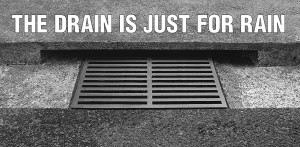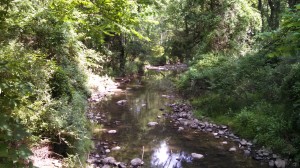The Clean Water Act is the federal legislation that governs stormwater management. Stormwater point discharges to waters of the U.S. (pipes and drain pipes) are regulated using National Pollutant Discharge Elimination System (NPDES) permits.
In 1999, federal regulations extended coverage of the NPDES program to local separate storm sewer systems (MS4’s) serving populations less than 100,000. Carroll Township is required to comply with the NPDES program as a MS4 municipality. Under the NPDES stormwater program, permittees must develop a stormwater management plan that provides the details of how the community will comply with the requirements of the permit. Permits are based on a framework of six minimum control measures:
- Public education and outreach
- Public participation and involvement
- Illicit discharge detection and elimination
- Construction site runoff control
- Post-construction storm water management in new development and redevelopment
- Pollution prevention and good housekeeping for municipal operations and maintenance
More information on this program is available from the Pennsylvania DEP website (See Links Below).
The MS4 Annual/Progress Report is available for public viewing at the Township Building during normal business hours.
Here’s how you can help:
The goals of all MS4 programs and the Township are to reduce the discharge of pollutants from the Township, to protect water quality and to satisfy requirements of the Clean Water Act. The success of this program relies on the cooperation of the Township and Township residents and businesses to improve water quality.
Stormwater from your home and from the public streets goes into a storm sewer, which goes directly into streams. This water is not cleaned in any way and does not go to the waste water treatment plant. The Township needs all of its residents to assist us in keeping our stormwater and stormwater sewer system clean by doing the following:
Vehicle and Garage
- Use a commercial car wash or wash your car on a lawn or other unpaved surface to minimize the amount of dirty, soapy water flowing into the storm drain and eventually into your local water body.
- Check your car, boat, motorcycle, and other machinery and equipment for leaks and spills. Make repairs as soon as possible. Clean up spilled fluids with an absorbent material like kitty litter or sand, and don’t rinse the spills into a nearby storm drain. Remember to properly dispose of the absorbent material.
- Recycle used oil and other automotive fluids at participating service stations. Don’t dump these chemicals down the storm drain or dispose of them in your trash.
Lawn and Garden
- Use pesticides and fertilizers sparingly. When use is necessary, use these chemicals in the recommended amounts. Avoid application if the forecast calls for rain; otherwise, chemicals will be washed into your local stream.
- Select native plants and grasses which are drought and pest resistant. Native plants require less water, fertilizer, and pesticides.
- Sweep up yard debris, rather than hosing down areas. Compost or recycle yard waste when possible.
- Don’t overwater your lawn. Water during the cool times of the day, and don’t let water run off into the storm drain.
- Cover piles of dirt and mulch being used in landscaping projects to prevent these pollutants from blowing or washing off your yard and into local water bodies. Vegetate bare spots in your yard to prevent soil erosion.
- Consider utilizing rain gardens, seepage pits, rain barrels, or other ways to reduce the amount of stormwater runoff. (for a list of ideas visit http://watershedsyork.org )
Home Repair and Improvement
- Before beginning an outdoor project, locate the nearest storm drains and protect them from debris and other materials.
- Sweep up and properly dispose of construction debris such as concrete and mortar.
- Use hazardous substances like paints, solvents, and cleaners in the smallest amounts possible, and follow the directions on the label. Clean up spills immediately, and dispose of the waste safely. Store substances properly to avoid leaks and spills.
- Purchase and use nontoxic, biodegradable, recycled, and recyclable products whenever possible.
- Clean paint brushes in a sink, not outdoors. Filter and reuse paint thinner when using oil-based paints. Properly dispose of excess paints through a household hazardous waste collection program, or donate unused paint to local organizations.
- Reduce the amount of paved area and increase the amount of vegetated area in your yard. Use native plants in your landscaping to reduce the need for watering during dry periods. Consider directing downspouts away from paved surfaces onto lawns and other measures to increase infiltration and reduce polluted runoff.
Pet Care
- When walking your pet, remember to pick up the waste and dispose of it properly. Flushing pet waste is the best disposal method. Leaving pet waste on the ground increases public health risks by allowing harmful bacteria and nutrients to wash into the storm drain and eventually into local water bodies.
Swimming Pool and Spa
- Drain your swimming pool only when a test kit does not detect chlorine levels.
- Properly store pool and spa chemicals to prevent leaks and spills, preferably in a covered area to avoid exposure to stormwater.
- Pool Water Fact Sheet: Click here.
Septic System Use and Maintenance
- Have your septic system inspected by a professional at least every 3 years, and have the septic tank pumped as necessary (usually every 3 to 5 years).
- Care for the septic system drain field by not driving or parking vehicles on it. Plant only grass over and near the drain field to avoid damage from roots.
- Flush responsibly. Flushing household chemicals like paint, pesticides, oil, and antifreeze can destroy the biological treatment taking place in the system. Other items, such as diapers, paper towels, and cat litter, can clog the septic system and potentially damage components.
Also, please monitor stormwater facilities near your property. No one should dump anything into the storm sewer system. If you see someone dumping please call the township at (717) 432-4951.
Some examples of Illicit Discharges would be:
- Sediment leaving a construction site in stormwater;
- Spills (Chemical, Gas, Oil);
- Illegal dumping activity into streams or storm sewers (PLEASE CALL 911 FIRST);
- Dry weather flows from outfall pipes into streams (72 hours after a rain storm)
Quick Reference Links for Stormwater Management:
York County Conservation District (YCCD)
http://yorkccd.org
Pennsylvania Stormwater Best Management Practices Manual
http://www.elibrary.dep.state.pa.us/dsweb/View/Collection-8305
U.S. Environmental Protection Agency (EPA)
Stormwater Discharges From Municipal Separate Storm Sewer Systems (MS4s) Site
http://water.epa.gov/polwaste/npdes/stormwater/Municipal-Separate-Storm-Sewer-System-MS4-Main-Page.cfm
Pennsylvania Department of Environmental Protection (DEP) http://www.depweb.state.pa.us/portal/server.pt/community/dep_home/5968
EPA’s Chesapeake Bay TMDL
http://www.epa.gov/chesapeakebaytmdl/


